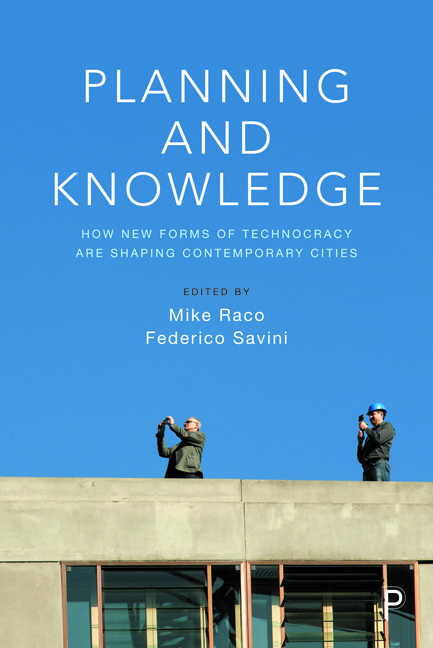Book contents
- Frontmatter
- Contents
- List of figures
- List of tables
- Notes on contributors
- Part I Conceptual framings of technocracy
- Part II Public planning and bureaucracies in contemporary urban development politics
- Part III Corporate knowledge and the land and property development sector
- Part IV Private consultants and the delivery of public policy
- Part V New constellations of actors and the management and governance of contemporary cities
- References
- Index
19 - Conclusions: the technocratic logics ofcontemporary planning
Published online by Cambridge University Press: 30 April 2022
- Frontmatter
- Contents
- List of figures
- List of tables
- Notes on contributors
- Part I Conceptual framings of technocracy
- Part II Public planning and bureaucracies in contemporary urban development politics
- Part III Corporate knowledge and the land and property development sector
- Part IV Private consultants and the delivery of public policy
- Part V New constellations of actors and the management and governance of contemporary cities
- References
- Index
Summary
In this concluding chapter we re-assess our corepropositions, as set out in Chapter 1, that soughtto reveal the multiple expressions of a ‘newtechnocracy’ found in the planning of contemporarywestern cities. We argued that technocratic planningoccurs: (i) when abstracted representations ofreality are used as the only legitimate form ofknowledge to understand and govern complex urbandynamics; (ii) when particular types of specialistexpertise monopolises governance processes; and(iii) when the instrumental rationalities ofproblem-based technical thinking dominates thepolitical field of (democratic) goal-setting.Preceding chapters have drawn on these corecharacteristics to examine and assess the emergenceof technocratic logicsin contemporary urban environments and theinterweaving of new modes of technocracy withpolitical projects and agendas following thefinancial crisis. While the term technocracy isassociated with particular, and very specific,historical conjunctures (compare Newman and Clarke,2018), we argue that by focusing on technocraticlogics and conceptions of technocracy it is possibleto develop more powerful insights into contemporaryplanning processes and governance dynamics.
At the heart of our discussion lies a dialectical tension betweenpolitical projects that seek to implementtechnocratic modes of governance in the pursuit ofbroader aims, on the one hand, and the complexitiesof places and place-politics that often lie beyondthe limits of technocratic calculation and controlon the other. The tensions between these dialecticalperspectives are on-going, subject to multipleinfluences, and prone to forms of incompleteness andcontestation at various scales. We have shown thatthe rolling out of technocratic logics is oftenunderpinned, in Gray's (2004) terms, by‘techno-utopian fantasies’ (p 22) that imagine thatit is possible to replace the divisive and sectariannature of everyday politics with rule by experts whounderstand how to govern in the name of the ‘commongood’.
The first part of this concluding chapter draws on thebook's contributions to examine the ‘newness’ ofcontemporary technocratic logics and practices.While it is difficult to identify a clear-cutphysiognomy of technocratic planning based onclassical definitions of the term, it is clear thatcontemporary knowledge and expert systems revolvingaround planning processes show that, under certainconditions, particular logics could be defined as‘technocratic’.
- Type
- Chapter
- Information
- Planning and KnowledgeHow New Forms of Technocracy Are Shaping Contemporary Cities, pp. 255 - 268Publisher: Bristol University PressPrint publication year: 2019



